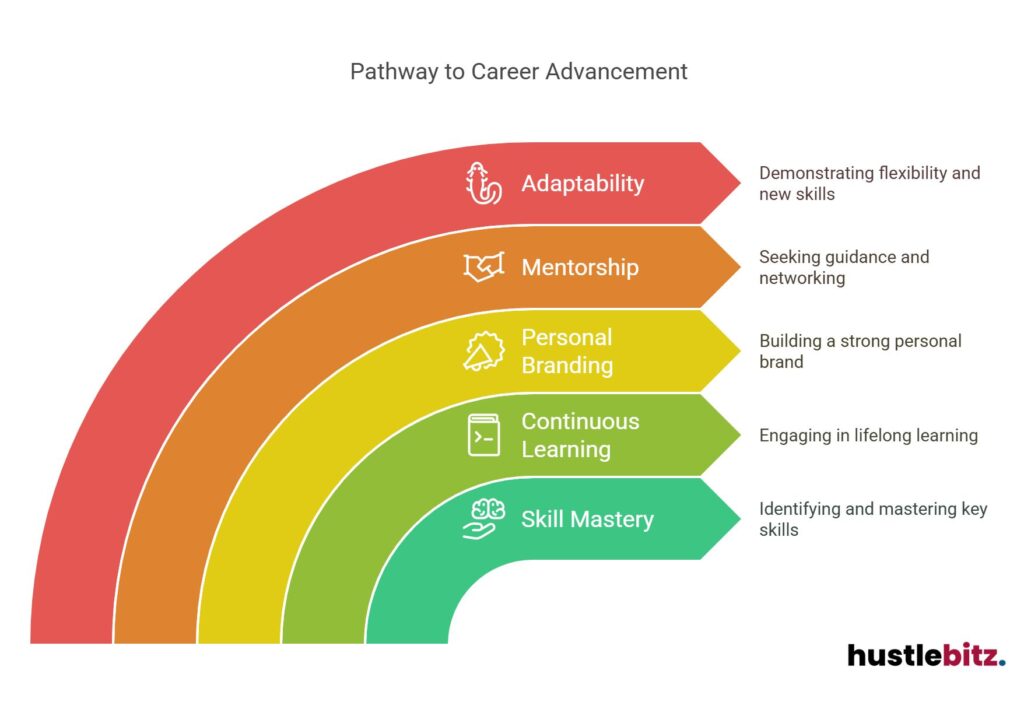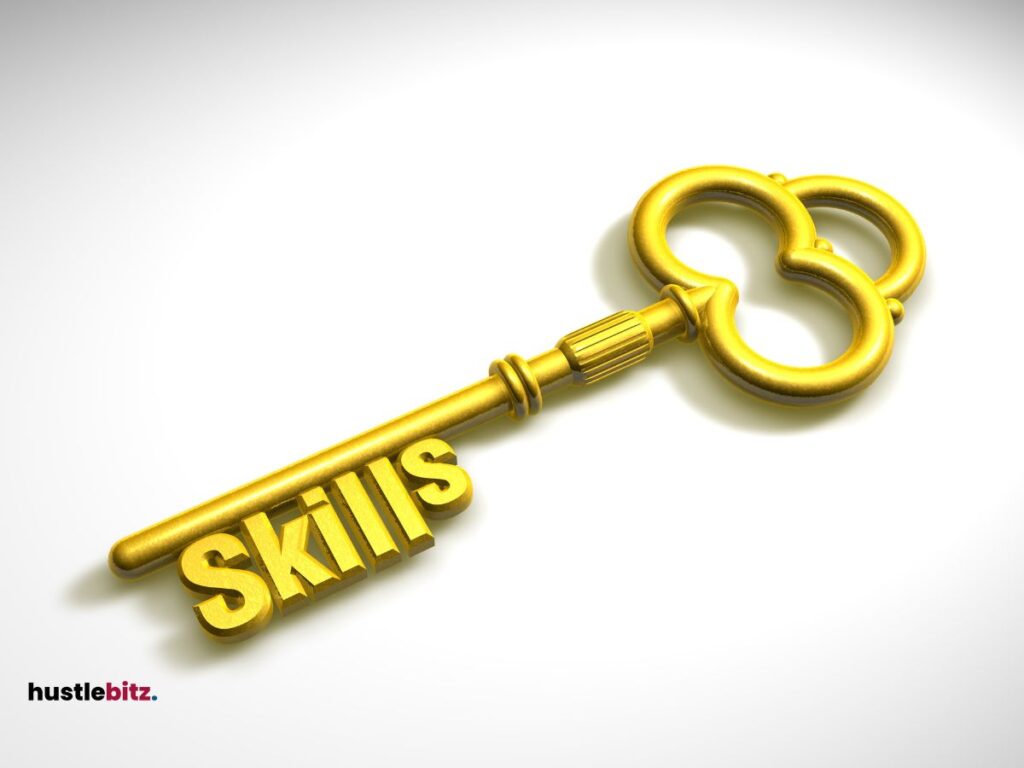Mastering skills is essential for career growth in today’s fast-paced job market. Identifying key technical skills, such as data analysis and programming, can significantly enhance your value. Equally important are interpersonal skills like emotional intelligence and adaptability, which foster effective communication and teamwork. Embracing continuous learning is vital for staying relevant and meeting industry demands. Furthermore, personal branding and strategic networking can position you for promotion opportunities. Lastly, seeking mentorship provides invaluable industry insights. Exploring these topics further reveals comprehensive strategies that can accelerate your professional development and success.
Key Takeaways
- Identify and master key technical and interpersonal skills to align with market demands and personal career aspirations.
- Engage in continuous learning through formal education, self-directed study, and networking to stay relevant in your field.
- Build a strong personal brand by showcasing authenticity, consistency, and visibility across professional platforms.
- Seek mentorship to gain insights, expand networks, and enhance skill development for long-term growth.
- Demonstrate adaptability and mastery of new skills to differentiate yourself and seize career advancement opportunities.

Identifying Key Skills

Identifying key skills is crucial for anyone seeking to advance their career, as it enables individuals to align their strengths with market demands and personal aspirations. In today’s competitive landscape, understanding the skills for career success is essential not only for securing employment but also for maintaining relevance in a rapidly evolving job market.
Key skills can be categorized into technical, interpersonal, and management skills, each playing a vital role in career advancement. Technical skills pertain to specific knowledge or expertise in a particular field, while interpersonal skills—such as communication and teamwork—are essential for effective collaboration. Management skills, which include strategic thinking and project management, are increasingly valued as professionals move into leadership roles.
Skill development is a continuous process that requires self-assessment and proactive learning. Individuals should regularly evaluate their current skill set against industry standards and emerging trends. This evaluation helps in identifying gaps and areas for improvement, thereby facilitating targeted skill development initiatives. Furthermore, engaging in professional development opportunities, such as workshops or online courses, can enhance one’s skill repertoire and increase marketability.
Ultimately, mastering essential skills for career growth not only enhances individual performance but also contributes to organizational success. By focusing on the identification and cultivation of key skills, professionals can position themselves strategically for future opportunities, ensuring a trajectory of continued growth and advancement in their careers.
Importance of Soft Skills
Soft skills, often referred to as interpersonal or people skills, are essential for fostering effective communication, collaboration, and leadership in the workplace.
Unlike technical skills, which are specific to a job function, soft skills encompass a range of abilities that facilitate interaction and engagement with others. These skills include emotional intelligence, adaptability, problem-solving, and teamwork, all of which are crucial for a harmonious work environment.
In the context of professional development, soft skills play a pivotal role in enhancing one’s career prospects. Employers increasingly seek candidates who not only have the requisite technical abilities but also possess strong communication skills and interpersonal skills.
The ability to convey ideas clearly, listen actively, and work collaboratively with diverse teams can significantly influence career advancement opportunities.
Moreover, soft skills contribute to effective leadership. Leaders who exhibit strong soft skills can inspire and motivate their teams, fostering a culture of trust and open dialogue.
This not only boosts team morale but also enhances overall productivity. As organizations continue to evolve, the demand for professionals who can navigate complex interpersonal dynamics will only grow.
Technical Skills in Demand

A diverse array of technical skills is currently in high demand across various industries, reflecting the rapid evolution of technology and the need for specialized expertise. As organizations strive to maintain a competitive edge, acquiring these technical skills is essential for individuals pursuing career advancement. Understanding which in-demand skills are crucial can significantly enhance one’s career development journey.
Among the most sought-after technical skills are:
- Data Analysis: Proficiency in interpreting and analyzing data to inform business decisions.
- Cloud Computing: Knowledge of cloud platforms, enabling efficient data management and access.
- Cybersecurity: Skills to protect sensitive information and ensure the integrity of digital environments.
- Artificial Intelligence and Machine Learning: Ability to develop and manage AI-driven systems that enhance automation and decision-making.
- Programming and Software Development: Expertise in coding languages that drive software innovation and application development.
These technical skills not only provide a solid foundation for career growth but also empower professionals to tackle complex challenges in their fields.
As industries evolve, staying updated with emerging technologies and trends is vital. Investing time to develop these in-demand skills is crucial for anyone looking to elevate their career trajectory.
Ultimately, mastering technical skills will not only enhance employability but also foster long-term success in an increasingly competitive job market.
Continuous Learning Strategies
Embracing continuous learning strategies is essential for professionals seeking to adapt to the ever-changing demands of their industries and enhance their career prospects. In today’s fast-paced work environment, the ability to acquire new knowledge and skills is crucial for career development and personal and professional growth. This commitment to lifelong learning not only keeps individuals competitive but also positions them as valuable assets within their organizations.
To effectively implement continuous learning strategies, professionals should identify the essential skills relevant to their career paths. These skills may encompass technical competencies, soft skills, and industry-specific knowledge. Engaging in formal education, such as pursuing advanced degrees or certifications, can provide a structured approach to skill enhancement. However, self-directed learning through online courses, webinars, and workshops can also be equally beneficial.
Networking with professionals in one’s field can further support continuous learning. Participating in industry conferences, seminars, and discussion forums allows individuals to exchange ideas, gain insights, and stay informed about emerging trends. Additionally, seeking mentorship from experienced colleagues can accelerate the learning process and provide guidance on navigating career challenges.
Incorporating a variety of learning methods—such as reading industry publications, listening to podcasts, or joining professional associations—can enrich one’s knowledge base. By prioritizing continuous learning strategies, professionals not only equip themselves with the necessary skills for career advancement but also foster an adaptable and innovative mindset essential for thriving in a dynamic work landscape.
Personal Branding Essentials

Establishing a strong personal brand is crucial for professionals aiming to differentiate themselves in a competitive job market and enhance their career opportunities. A well-defined personal brand not only reflects your unique identity but also aligns with your career aspirations and professional skills. In today’s dynamic work environment, mastering soft skills is equally important as technical expertise, making personal branding an essential component of career growth.
To effectively cultivate your personal brand, consider the following essentials:
- Authenticity: Be genuine in your interactions and communications, allowing your true self to shine through.
- Consistency: Maintain a coherent message across all platforms, including social media, resumes, and interviews.
- Networking: Build and nurture relationships within your industry to amplify your presence and credibility.
- Visibility: Engage in professional development activities, such as workshops or conferences, to showcase your skills and expertise.
- Continuous Improvement: Regularly assess and refine your brand to adapt to new trends and feedback, ensuring relevance in your field.
Focusing on these elements not only enhances your visibility but also demonstrates your commitment to personal and professional development.
Apply New Skills for Maximum Impact

Mastering new skills is vital for professionals looking to enhance their personal brand and make a significant impact in their careers. In today’s competitive job market, the ability to acquire new skills is a key factor that can set you apart from your peers. This not only involves technical competencies but also encompasses essential soft skills for career advancement, such as communication, teamwork, and emotional intelligence.
By actively applying these newly acquired skills in your current role, you can demonstrate your commitment to professional growth and adaptability. Skills enable you to tackle challenges effectively, innovate within your field, and contribute meaningfully to your organization. For instance, strong communication skills can improve collaboration among team members, leading to more efficient project outcomes.
Moreover, integrating these skills into your daily work processes can significantly enhance your career prospects. Employers increasingly seek individuals who can adapt to changing environments and lead initiatives with confidence. By showcasing your ability to apply new skills, you position yourself as a valuable asset, paving the way for opportunities such as promotions or leadership roles.
Seeking Mentorship Opportunities

One effective strategy for career growth is actively seeking mentorship opportunities that can provide guidance, support, and valuable insights from experienced professionals in your field.
Engaging with a mentor allows you to master the skills required for advancement while expanding your professional network. A mentor can help you navigate the complexities of your industry, identify potential career paths, and enhance your understanding of the skills necessary for success.
To maximize the benefits of mentorship, consider the following steps:
- Identify Your Goals: Clearly define what you hope to achieve through mentorship, such as skill development or industry insights.
- Research Potential Mentors: Look for individuals within your professional network who have the experience and knowledge that align with your career aspirations.
- Build Relationships: Approach potential mentors with genuine interest and respect. Establish rapport by engaging in meaningful conversations about shared interests.
- Be Open to Feedback: Embrace constructive criticism and be willing to adapt your approach based on your mentor’s insights.
- Follow Up and Show Gratitude: Maintain communication with your mentor and express appreciation for their guidance, fostering a lasting professional relationship.
Final Thoughts
Mastering skills for career growth is an ongoing journey that requires deliberate effort and strategic planning. By identifying key technical and soft skills, engaging in continuous learning, and building a strong personal brand, you can position yourself for long-term success in your career. Seeking mentorship and applying your skills effectively are crucial steps in navigating the complexities of professional development. Remember, the key to sustained career growth lies in your ability to adapt, learn, and strategically leverage your strengths to seize opportunities as they arise. Stay committed to these strategies, and you’ll find that your career path is both rewarding and fulfilling.




